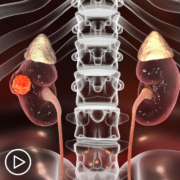With RMC Being an Aggressive Cancer, What Is the Prognosis?
With RMC Being an Aggressive Cancer, What Is the Prognosis from Patient Empowerment Network on Vimeo.
What is the prognosis for renal medullary carcinoma (RMC) patients? Expert Dr. Nizar Tannir explains RMC prognosis and how patients and healthcare providers can work together to ensure their best care and more treatment options in the future.
Dr. Nizar Tannir is a Professor in the Department of Genitourinary Medical Oncology, Division of Cancer Medicine at The University of Texas MD Anderson Cancer Center.
[ACT]IVATION TIP
“…never, ever give up. Get the facts, seek care at the hands of the experts, and we’re here to help. And there is hope.”
Download Guide | Descargar Guía
Related Resources:

Intensive Exercise and Renal Medullary Carcinoma: Is There a Connection |

How Do You Explain RMC to Newly Diagnosed Patients and Families? |

|
Transcript:
Cora:
Sometimes searching online, you see statistics, and they look extremely grim. What is the prognosis for RMC?
Dr. Tannir:
RMC is a very aggressive type of cancer. And it is, unfortunately, the most aggressive kidney cancer type. Whereas the most common type of kidney cancer we see and treat in the clinic, in the hospital is clear cell. And that type of cancer has many treatment options. Some of them have been FDA-approved, and it’s a common type of cancer where we can do large clinical trials that lead to new therapies. RMC, unfortunately, because of its rarity, because of the difficulty of doing large trials we still do not have all the therapies that we would like to test as we test in other more common types of kidney cancer.
So far, the diagnosis carries a guarded prognosis because of the aggressive nature of RMC. But as I tell my patients with RMC, and you know this, Cora, when I met Herman and patients before Herman and after Herman. I tell them we have to be frank and honest with the patients. They have to be aware, they have to be engaged and to get them engaged, to get them to be trusting of the provider, physician, and the institution, you have to level with them and look them in the eye and share with them that the prognosis is guarded. But there is hope.
And I think I always start my message before they leave the clinic, before I leave their hospital room, if I have seen them in the hospital, is that it’s a difficult cancer. It’s an aggressive cancer, but we’re in this together and there is hope and we have a plan. And I think we can’t separate the two. We can’t, yes, it is aggressive, the prognosis is guarded, but there is hope and you have to give them a plan. So I think once you establish that relationship with the patient, then they trust you and they will do whatever it takes for them to get well. You get them on the road to recovery and hopefully cure.
But it starts with hope. We can’t just say it is guarded prognosis, bleak prognosis, poor prognosis, and stop there. Yes, it is aggressive cancer. So my activation tip here is never, ever give up. Get the facts, seek care at the hands of the experts, and we’re here to help. And there is hope.
Share Your Feedback:
Create your own user feedback survey









